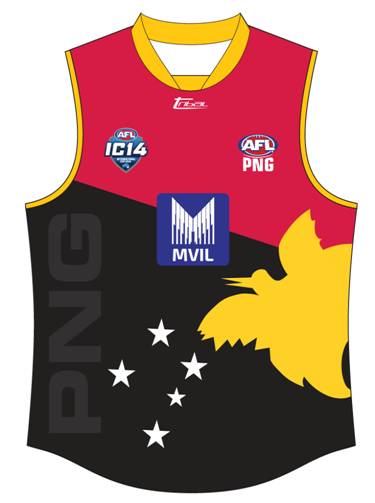![]() Apologies for late publication, an editorial oversight.
Apologies for late publication, an editorial oversight.
Women's Grand Final, Punt Road Oval, 23rd August 2014
On the day on which footy’s traditional rivals, Geelong and Hawthorn clashed just across the Yarra Parklands, where footy began, the Canadian Northern Lights comprehensively defeated the 2011 champions, Ireland. It might have even been bigger than the traditional rivalries in international ice hockey and in the Olympic pool.
With 9 Canadians and 6 Irish footballers in the IC2014 best players’ team, and the Banshees’ Laura Corrigan named Female Player of the Tournament, it was guaranteed to be a clash of the titans.
While the Irish ran as a phalanx in the pre-match, the Canadians, supported by either a larger crowd or by more colourful supporters, warmed up with skills and drills.
That was how the game would unfold.
The Canadians attacked from the opening bounce, their forward movements only limited by Grand Final nerves, with some fumbling, followed by inaccurate kicking for goal, and behinds rushed due to Irish pressure.
Irish marking in the last line of defence seemed the only area of Banshee dominance.
In the first quarter, Canada’s the fast running Emma Dickinson drove the ball forward repeatedly with long kicks. She displayed a level of skill which had left some other players on both sides, under Grand Final pressure. After all, ‘grannies’ are not always the most attractive and highly skilled of footy matches, due to that pressure.
A solitary point to the Canadians over an Ireland which had rarely taken the ball forward, did not reflect their dominance.
In a sport which had only grown in the last few years, the Canadians had clearly worked on their skills and team system to defeat the 2011 champions.
Time after time, handballs out of packs, and strings of handballs in attack –which worked better than they did for Geelong later in the evening – demonstrated Canadian superiority.
Would the Irish come back in the second quarter, after they had settled?
Despite the solid marking of Rachel McCann, from the Irish Exiles club, in defence, the Canadians continued to notch up points, with their running game, finally goaling.
Even when Paula Keatley took the ball forward from the centre square for the Banshees it went no further than the 50 metre line. For the Canadians, Charnelle Willis, dubbed the ‘purple people eater’ by some Canuck fans (due to her purple hints in the hair) was picking up kicks.
Crucially, the Canadian captain Aimee Legault, from the Montreal Angels, was beginning to display her angelic skills of run on football and long kicking, although again Canadian attacks were often marked by the Irish in the last line of defence.
The Irish were hitting harder, but several times Irish players came down after heavy tackles, rather than their opponents. It seemed that the Irish were frustrated, and it was starting to show in the way they played, while the Canadians seemed to be in possession for 70-80% of the time.
The umpires continued to maintain the brilliant standard of umpiring which has characterised the tournament, with roles also played by two American umpires, central umpire Nicole Fasula and goal umpire Toby Persson.
When the Irish again crashed into Aimee Legault a 50 metre penalty allowed her to put the ball into the goal mouth, and then Kirsten Bodashefsky kicked poorly from a slight angle. Only the Canadians’ bad kicking for goal was keeping the Irish in it, with a half time lead of only 1 goal 7 points 13 to three fat zeros for the Banshees.
In the third quarter, the Irish pressure increased, as if the number of Irish players with Australian experience was beginning to impact on their performance.
An early Irish goal suggested that the Banshees still had a chance. However, two Canadian goals, one from a free directly in front, gave the Canadians a comfortable lead of 14 points, which grew to 20 points by the final break, 3 8 26 to one solitary goal.
Three interested watchers, clearly playing for a team which wore black (although only two are Melbourne based) were AFL chief commissioner Mike Fitzpatrick, clearly the ruckman, and the ruck rover and rover, Samantha Mostyn from Sydney and Linda Dessau. They must have been delighted by the display of skills and pressure football which characterise the women’s game, and by the large and enthusiastic crowd.
Like the earlier support of the IC2014 of ‘Mr Football’, as he was known, Ron Barassi, Brian Dixon and Dipper (Robert Dipierdomenico), this was a sign that international footy is a serious business.
Perhaps the umpies might have been less pleased, but nor surprised, as cries of ‘pathetic’ flew from the partisan crowd earlier in the match.
At a time of the continued dominance, in general play, as well as in the ruck of the tall, but lightly framed, Canadian first ruck, Sylvie De Brabandere, the Canadians were now in control, despite the strong defence of Una McKay and of the marking of Emma Perry.
Staring defeat in the face, the Irish continued to hit hard, too hard. There was feeling in the game as the fiery Irish applied physical pressure, with Laura Corrigan sent off after a Canadian was on the turf, and taking a while to get up.
In the last quarter, Canadian dominance finally asserted itself on the scoreboard, even after an early Irish goal suggested that they were not out of the game. Finally, as the free kicks started to flow to the team which led the run to the ball, the Canadians ran out convincing, and well-deserved, winners, 5 8 38 to a meagre Irish two goals.
The goalkicking of Kirsten Bodashefsky and Kendra Heil made the difference, each finishing with two goals apiece, with Heil’s first half bomb a key moment in the match.
Despite token security games, when the Canadian bench ran on the field, at the same time as the Canadian men’s cheer squad gathered on the Punt Rd side off the ground, it was clear that the community of football present in the International Cup was more important than attempts to maintain ersatz order.
Throughout the International Cup has been a festival – a festival of footy, as was apparent by players and supporters from other countries watching the match.
The intermingling of players after the match kept up the IC’s tradition of harmony, of footy being bigger than country.
The presentation of the Premiership Cup and the medals to players by AFL Commissioner Sam Mostyn provided a ceremonial conclusion. The tears of happiness of Canadian captain Aimee Legault, who also won the award for the best player of the final, and the pleasure of coach Jason Arnold, provided a great emotional moment.
As the Canadian Northern Lights had run onto the field through their CanEnglish joking banner it was ‘Aboot time’ for the Light to shine, after several years of developing their game.
And finally (slightly better than the ubiquitous Gatorade sprays), the Canadian innovation of a tunnel of fans for the players to run through going back to the changerooms brought a fitting finale to a great competition.
Canada Northern Lights: 0.1 1.7 3.8 5.8 (38)
Ireland: 0.0 0.0 1.0 2.0 (12)
Goals
Canada Northern Lights: Heil 2, Bodashefski 2, Legault
Ireland: Corrigan, Keatley
Best
Canada Northern Lights: Legault, Heil, Perry, Dickinson, Annicchiarico, Robertson
Ireland: Kelly, Behan, McKay, McCann, Corrigan, Hazley
![]()
ABOOT time - Canadian English Aussie Rules pun
![]()
A familiar sight - Laura White kicks for goal
![]()
Canadian ruck star Sylvie De Brabandere
![]()
Rover Ruck Rover & Ruckman for AFL Commission - Commissioners Linda Dessau, Sam Mostyn Mike Fitzpatrick-med
![]()
After the siren
![]()
Captain Aimee Legault - tears of happiness
![]()
Cup and medals ...
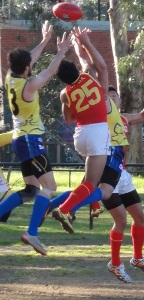 Friday August 22
Friday August 22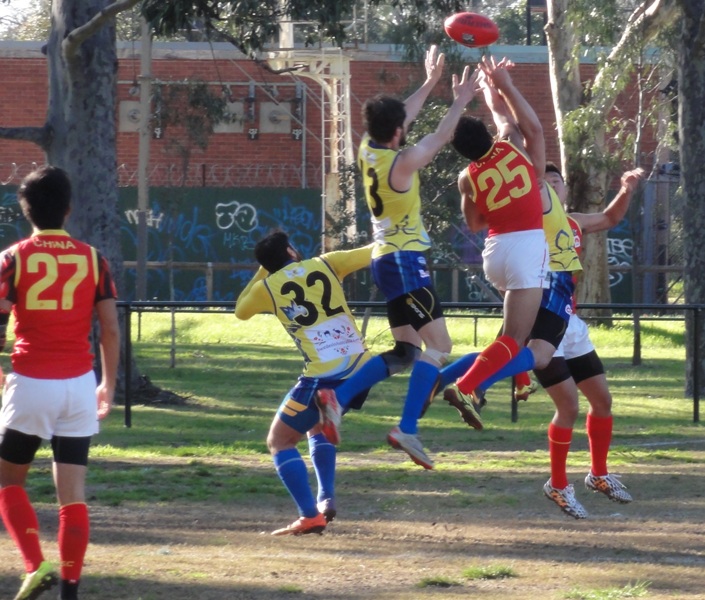
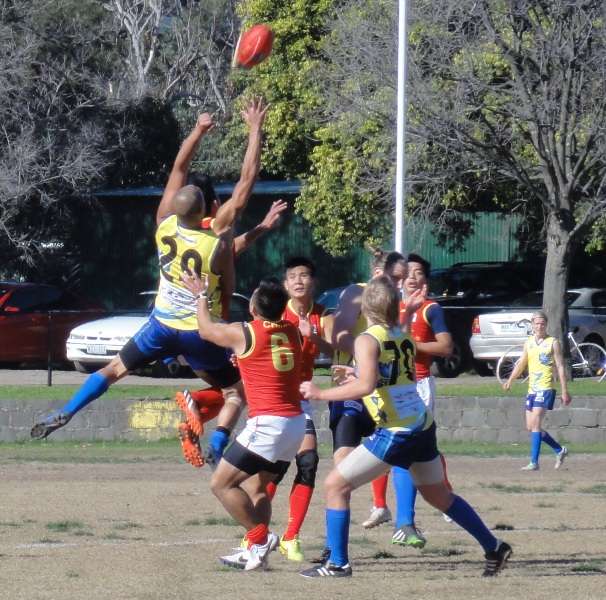 ...
...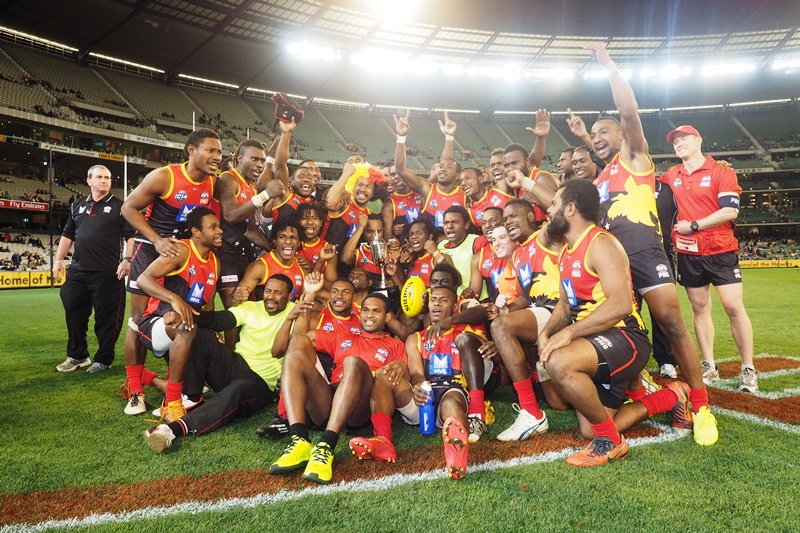
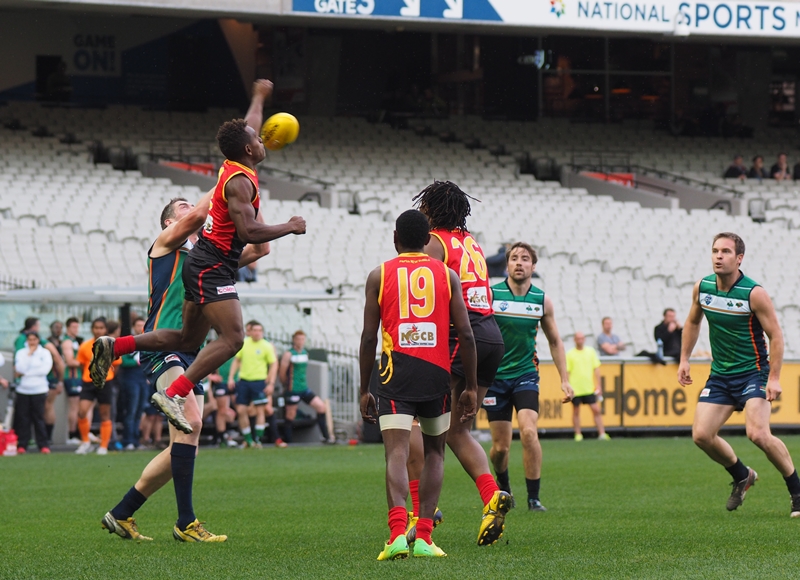
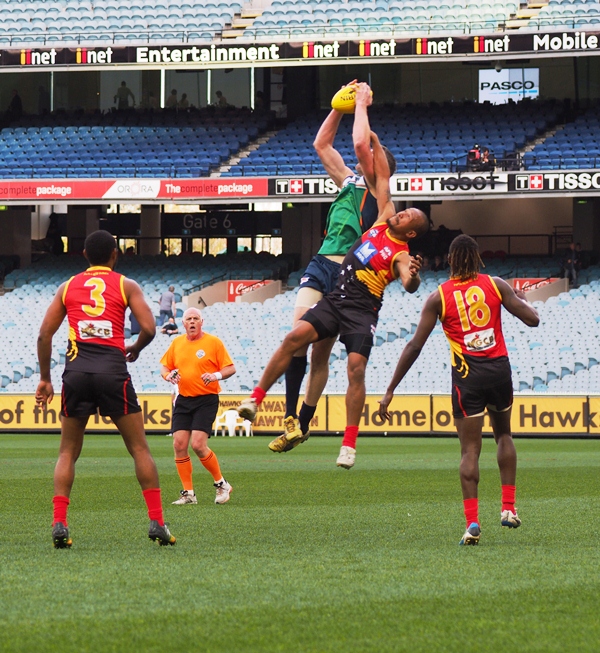
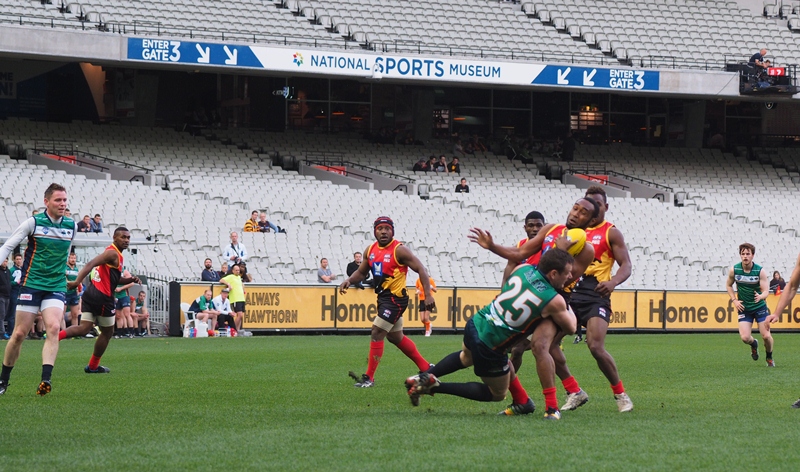
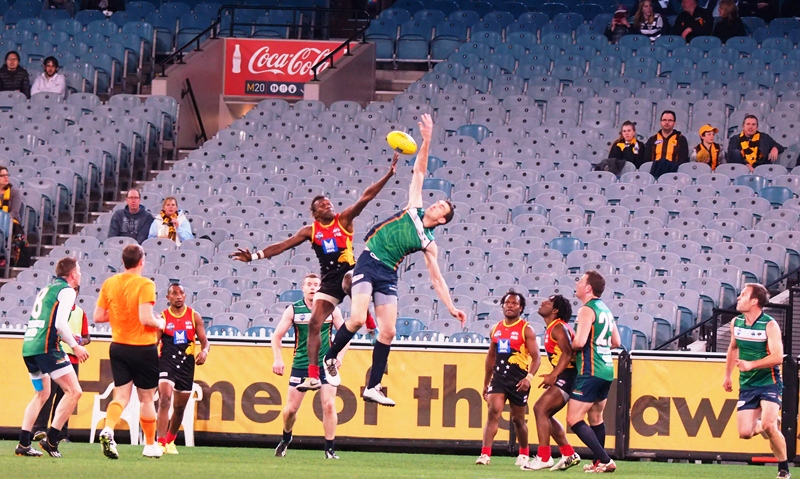
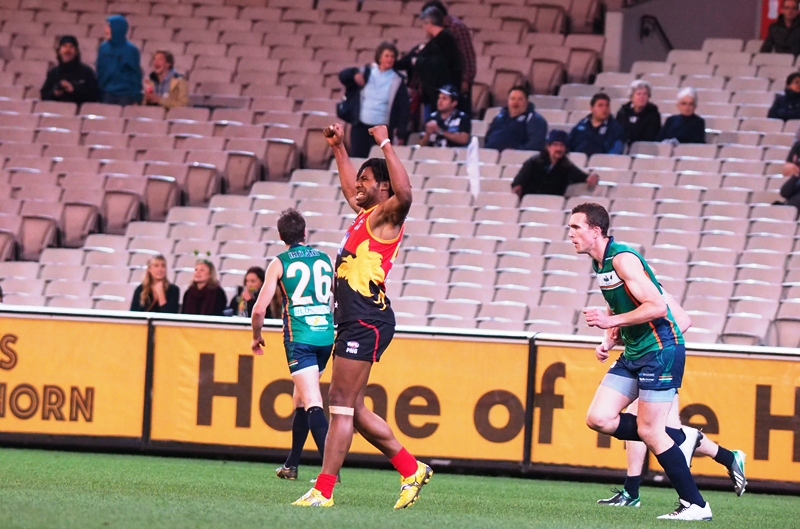
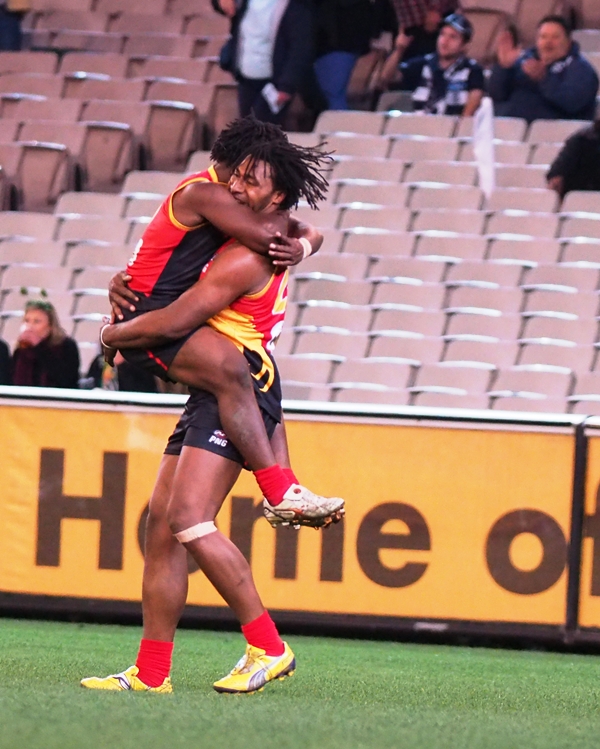
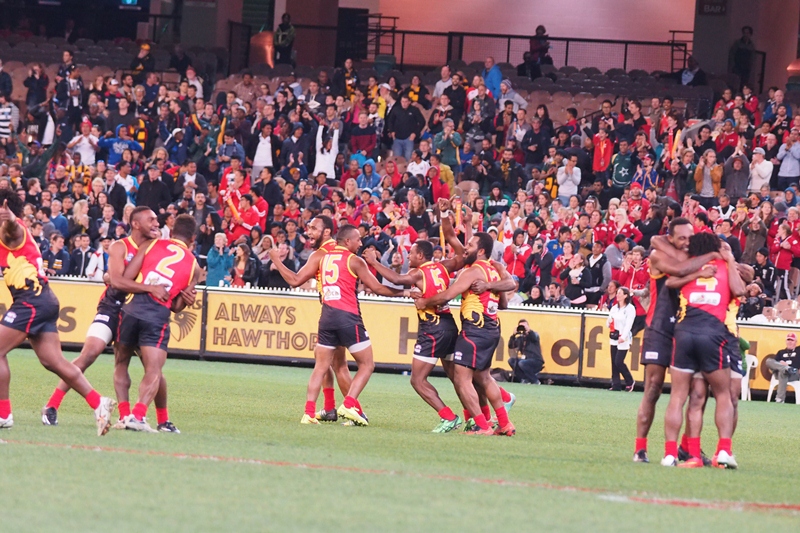
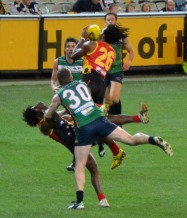 Cometh the moment, cometh the man (or woman). For PNG tonight that moment arrived midway through the final term when undersized ruckman John Ikupu who had been battling it out against the taller Irish followers - flew back with the flight of the ball to take a classic and courageous mark. From directly in front he coolly slotted the goal that put the Mozzies in front and helped cement a best on ground performance.
Cometh the moment, cometh the man (or woman). For PNG tonight that moment arrived midway through the final term when undersized ruckman John Ikupu who had been battling it out against the taller Irish followers - flew back with the flight of the ball to take a classic and courageous mark. From directly in front he coolly slotted the goal that put the Mozzies in front and helped cement a best on ground performance.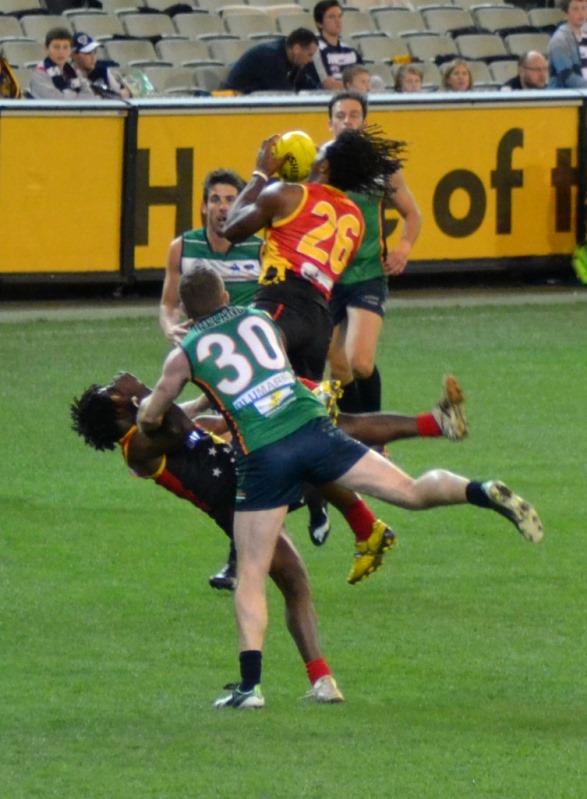
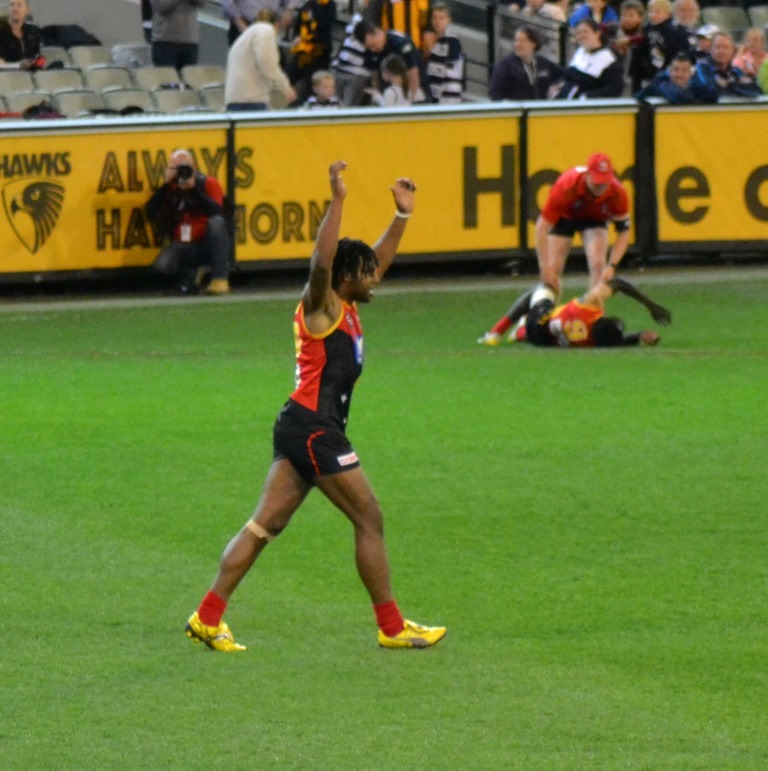
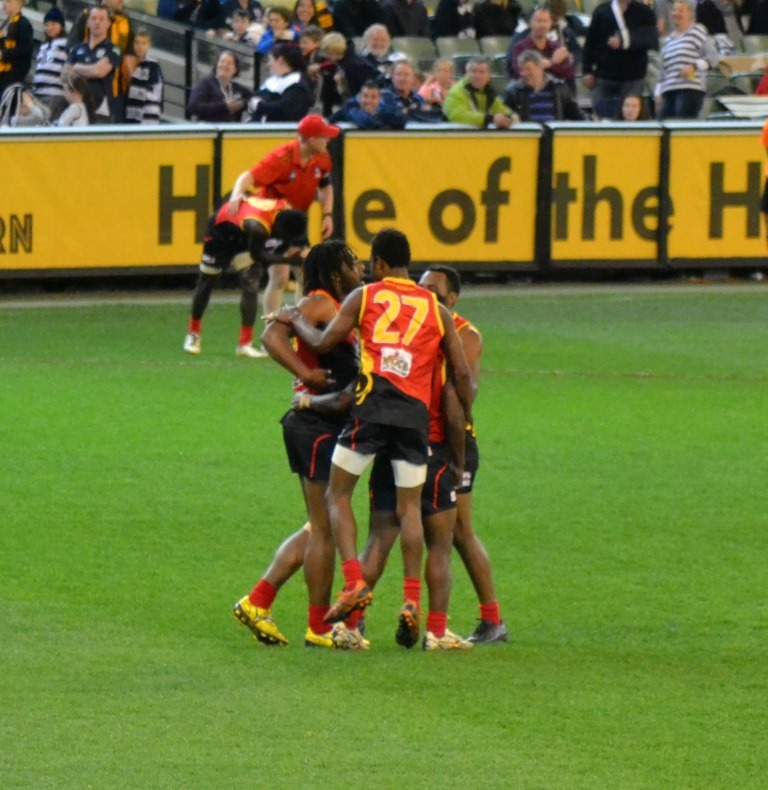 ...
...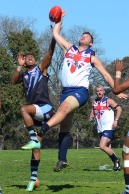 The midday game on Western Oval pitted IC14 old rivals Great Britain Bulldogs and Fiji Tribe against each other for the second time. These sides fought a tough encounter on Community Cup Saturday at Bulleen and the enjoyed a social evening at the Manningham Cobras rooms. Friends were made, respect established – but today all that matters is finishing off with a win and for the Bulldogs having lost successive matches to Nauru, Fiji and Nauru again – there was a sense of having underperformed.
The midday game on Western Oval pitted IC14 old rivals Great Britain Bulldogs and Fiji Tribe against each other for the second time. These sides fought a tough encounter on Community Cup Saturday at Bulleen and the enjoyed a social evening at the Manningham Cobras rooms. Friends were made, respect established – but today all that matters is finishing off with a win and for the Bulldogs having lost successive matches to Nauru, Fiji and Nauru again – there was a sense of having underperformed.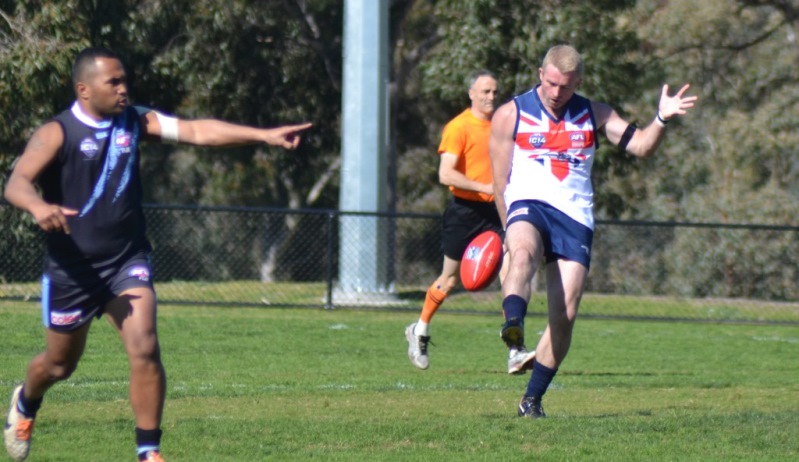
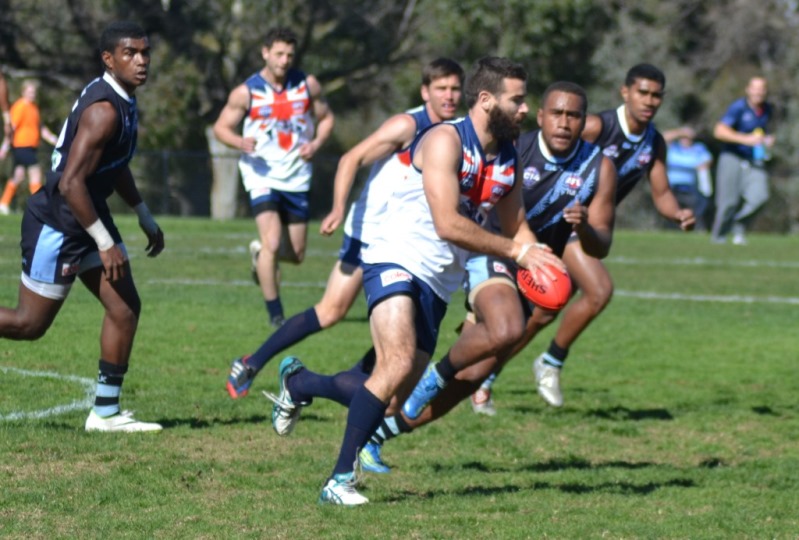 ...
...
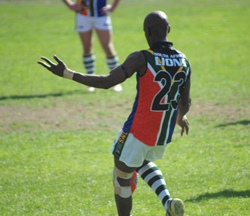 The New Zealand Hawks have finished third at IC14 after beating South Africa Lions by one point in the third place playoff. The match went down to the wire, with a point scored by Andrew Howison enough to have NZ hold on for the win.
The New Zealand Hawks have finished third at IC14 after beating South Africa Lions by one point in the third place playoff. The match went down to the wire, with a point scored by Andrew Howison enough to have NZ hold on for the win.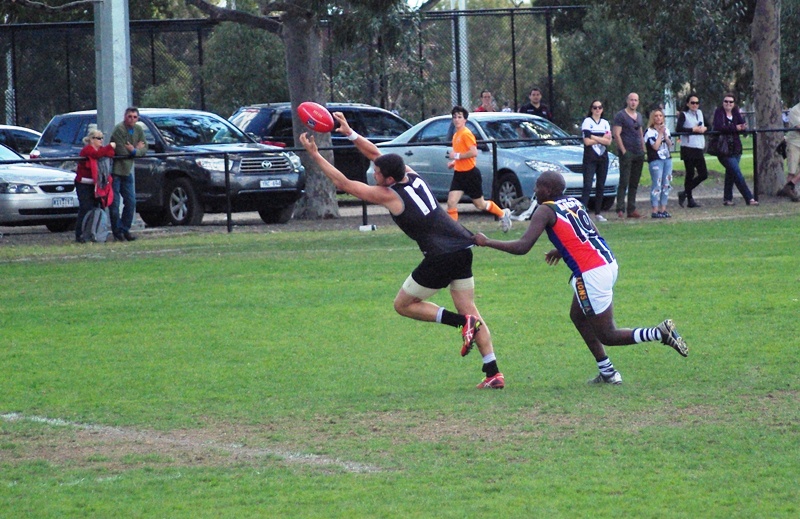
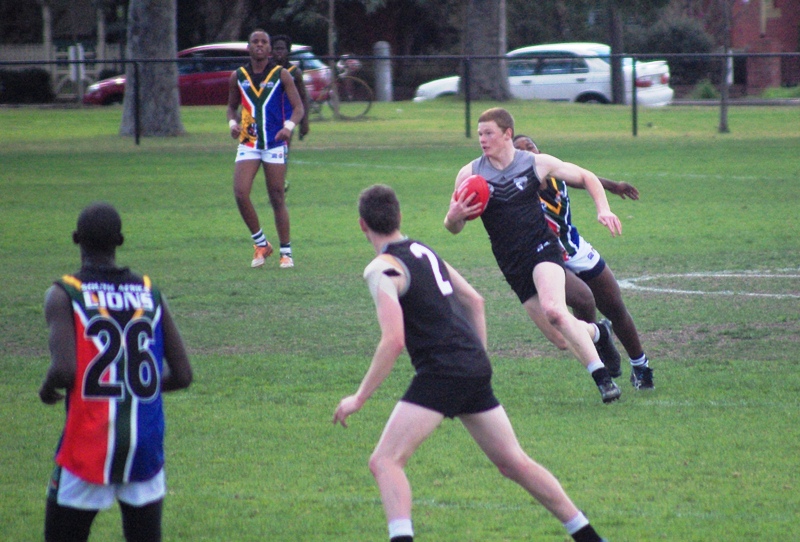
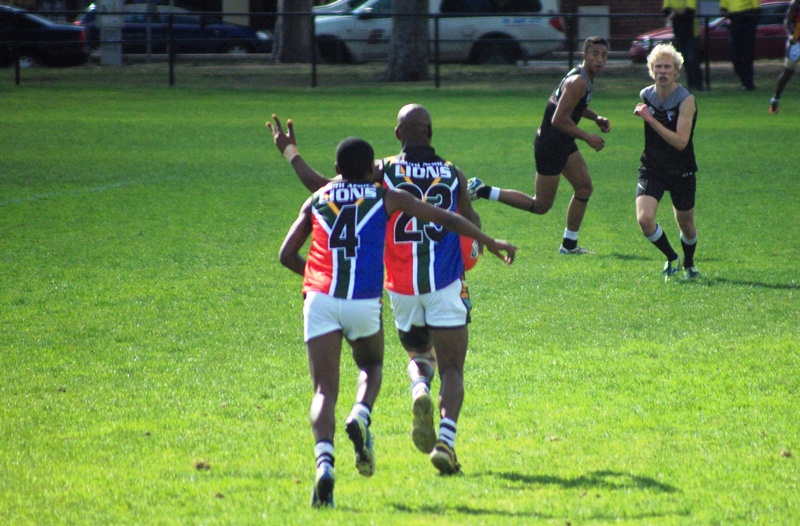
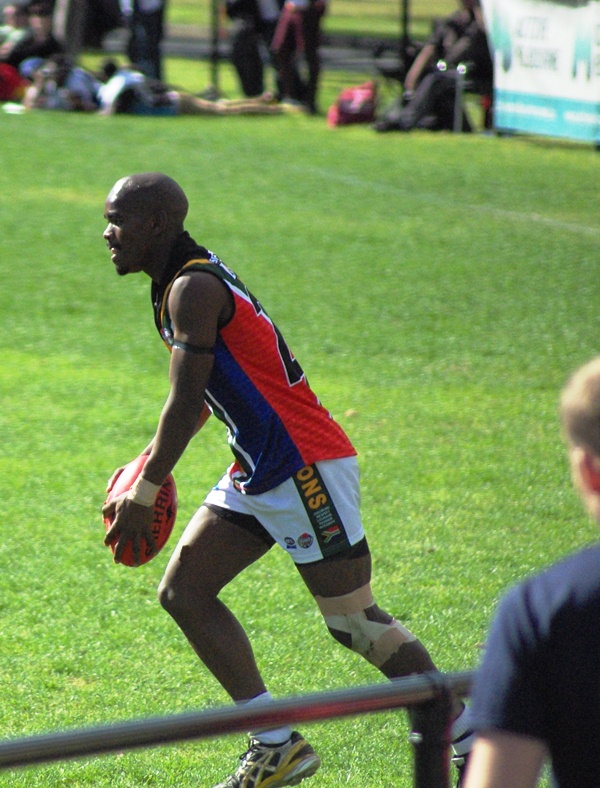
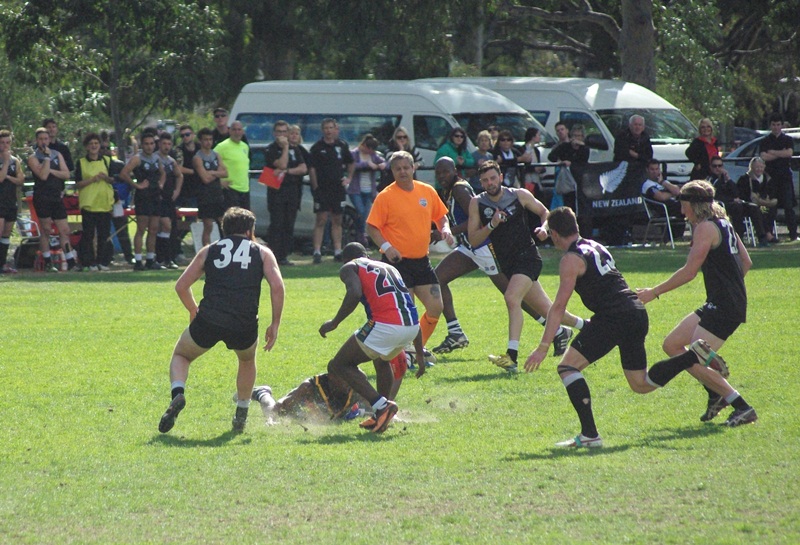
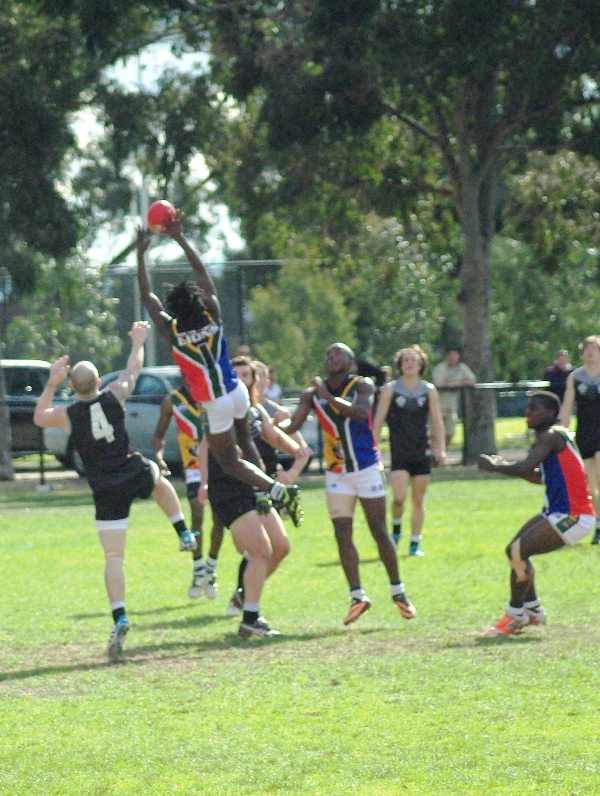
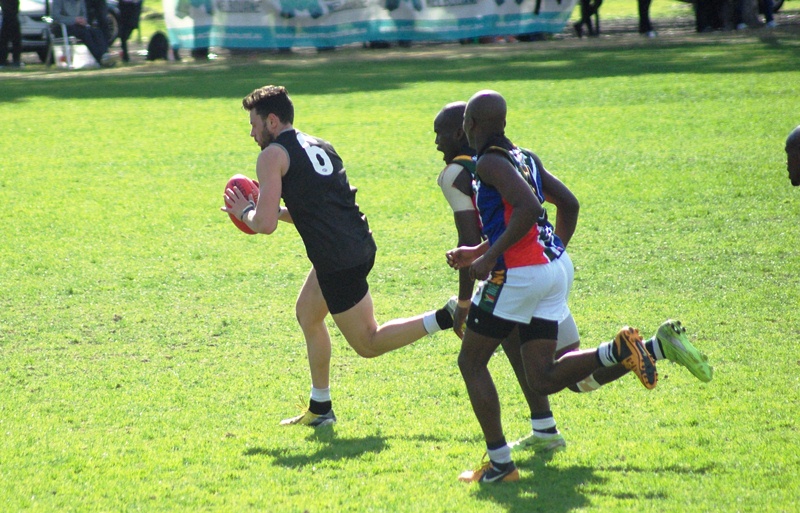 Sam McKenzie runs around defenders to score vital goal. ...
Sam McKenzie runs around defenders to score vital goal. ...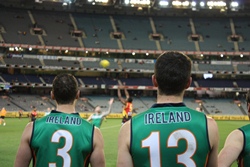 John Corrigan gives us his match report from an Irish perspective.
John Corrigan gives us his match report from an Irish perspective.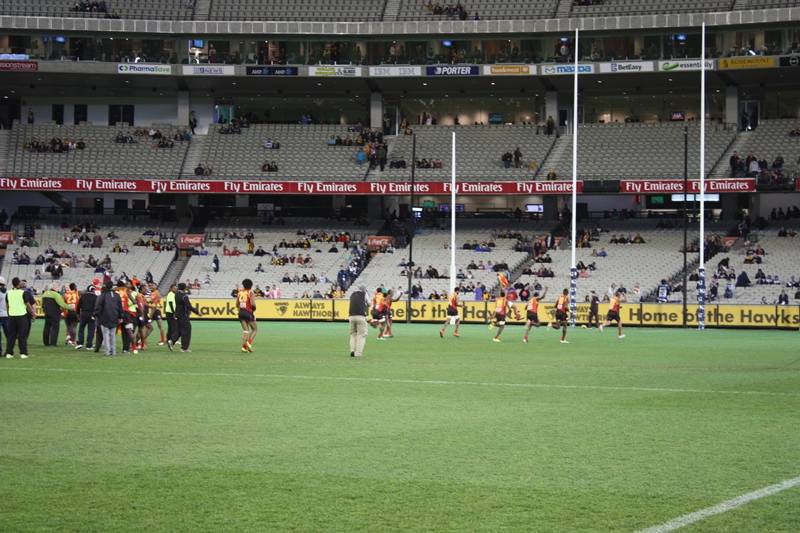
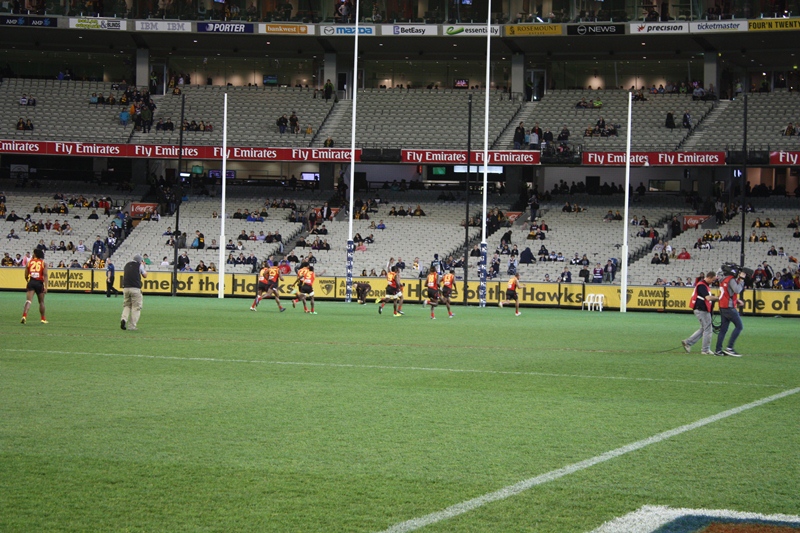
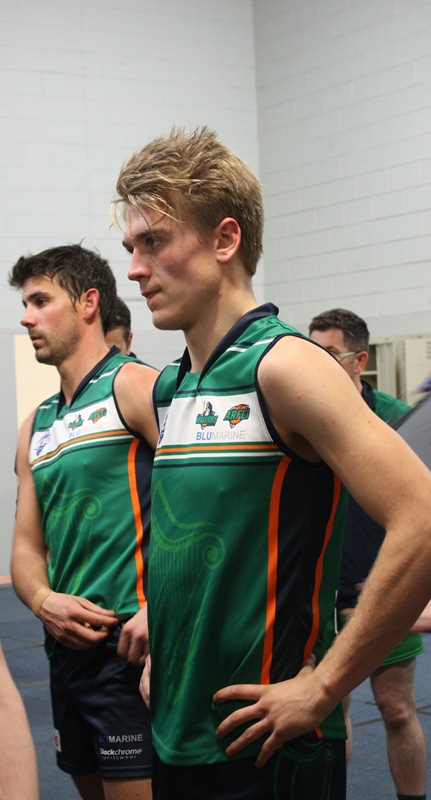
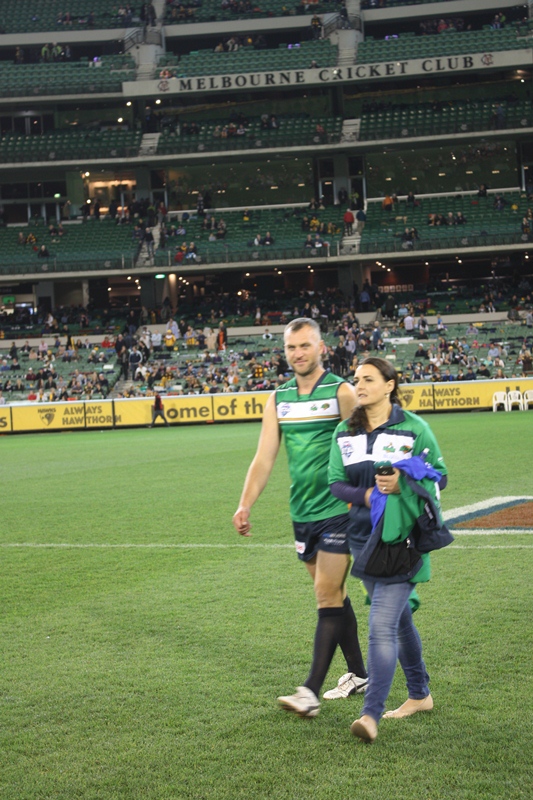
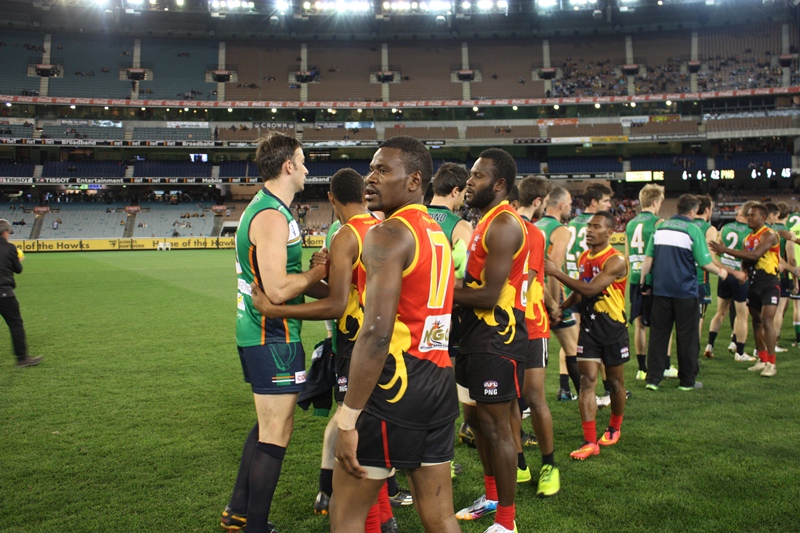
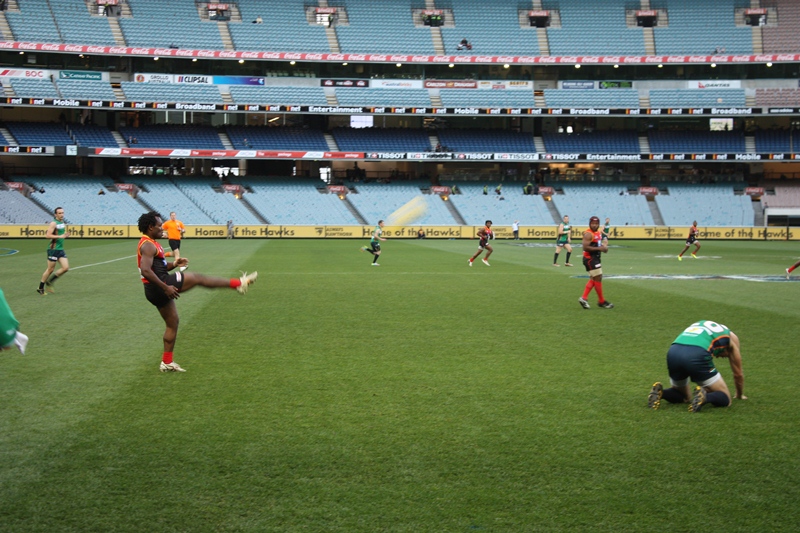
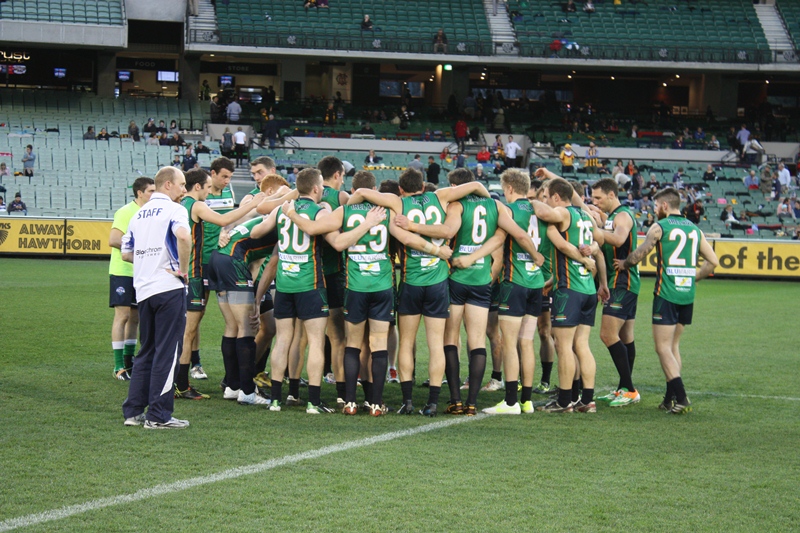
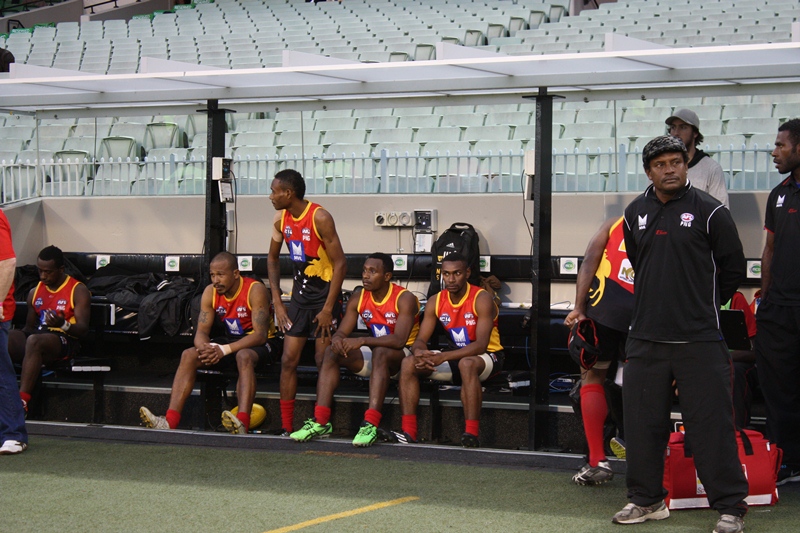
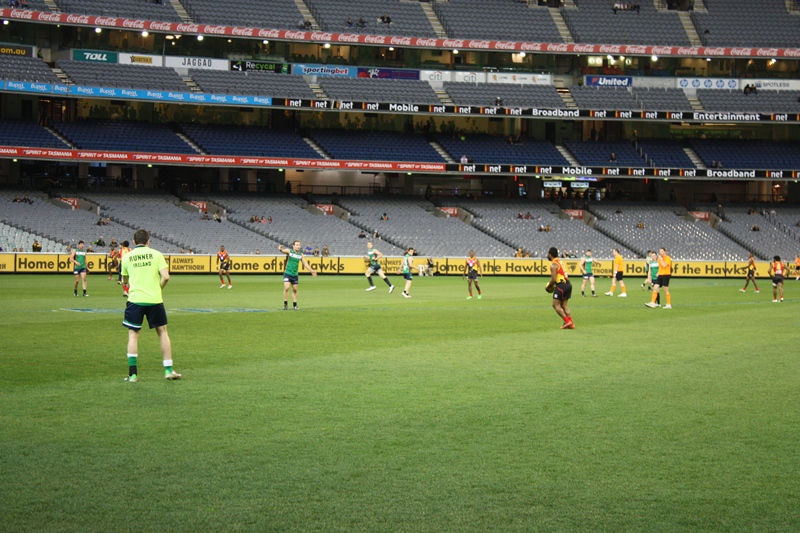
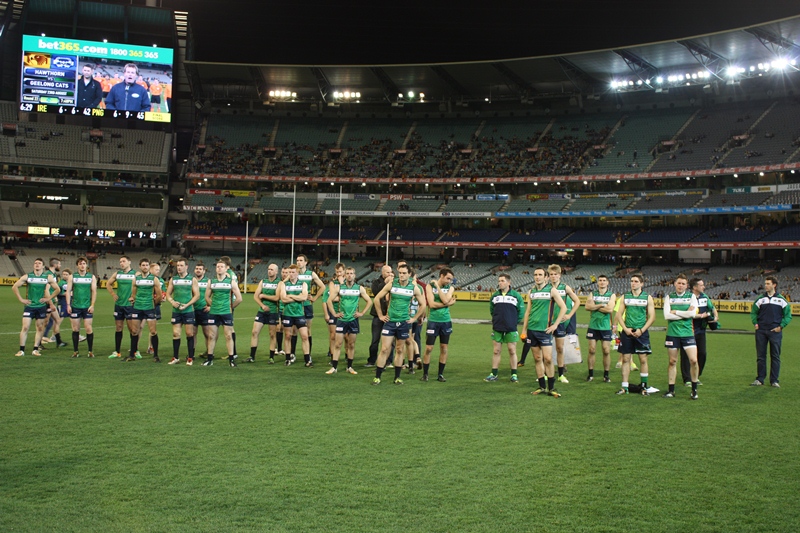
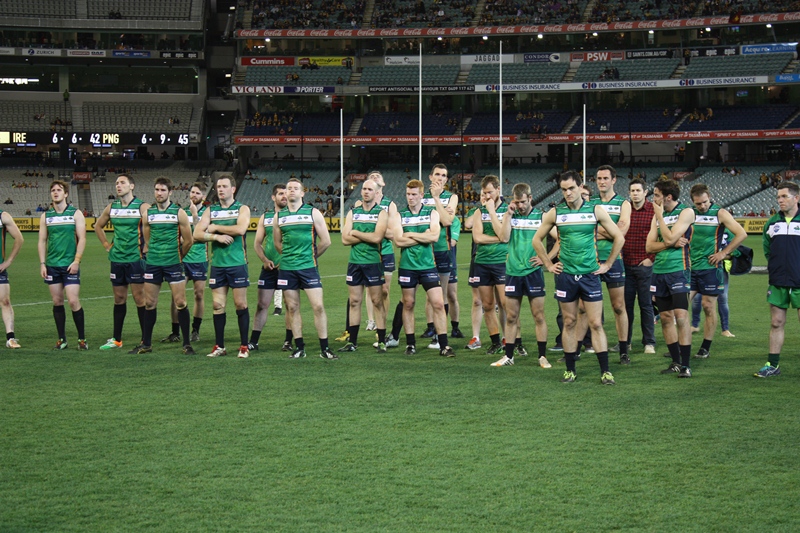
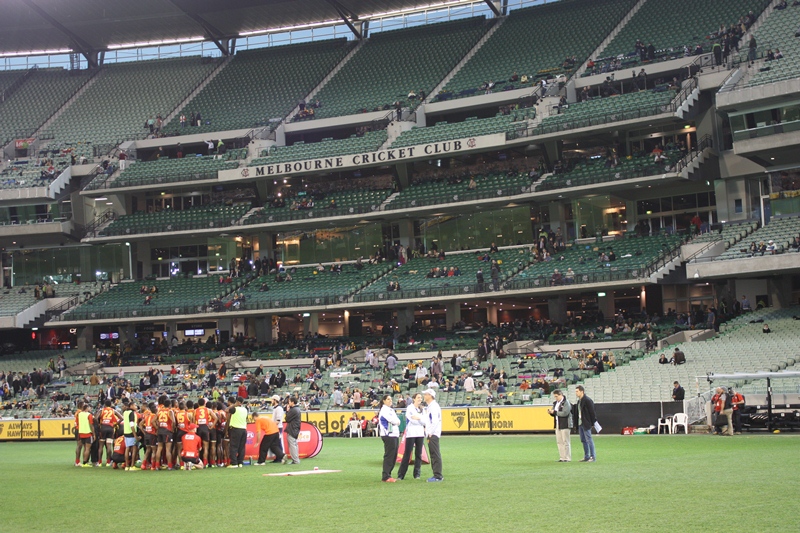
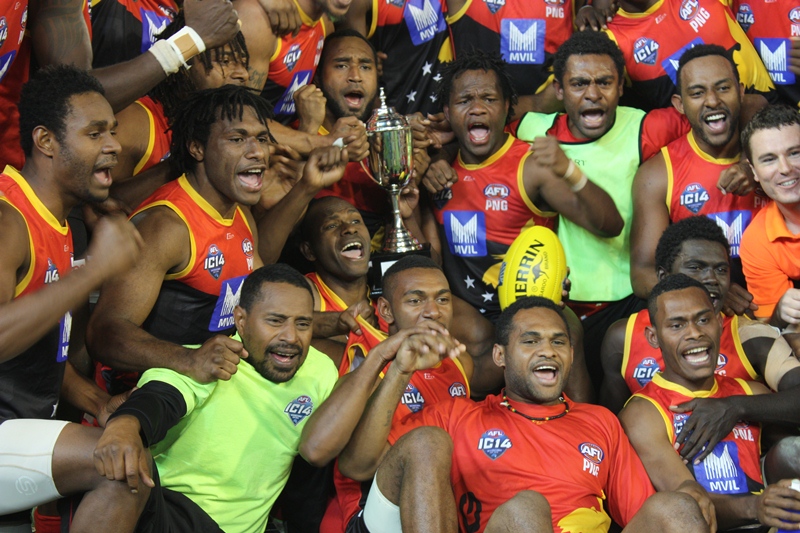
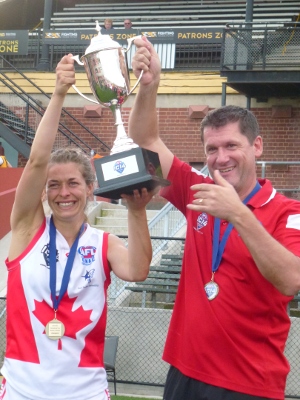 Apologies for late publication, an editorial oversight.
Apologies for late publication, an editorial oversight.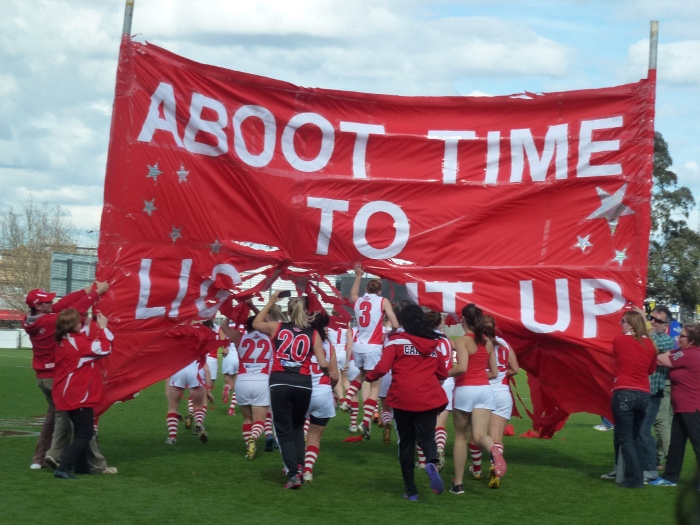
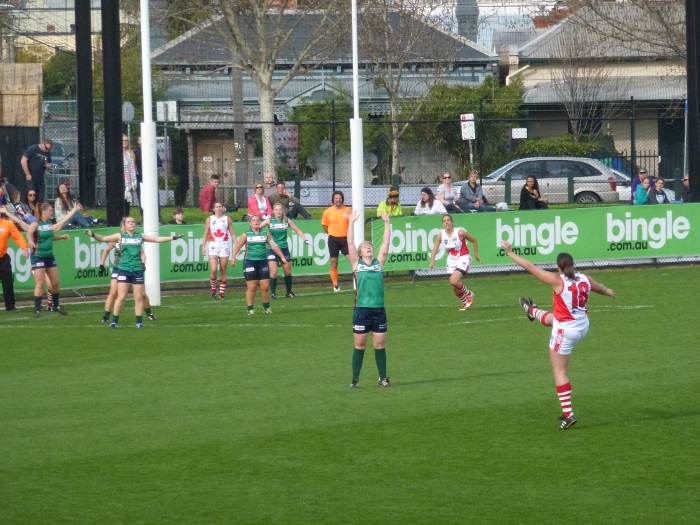
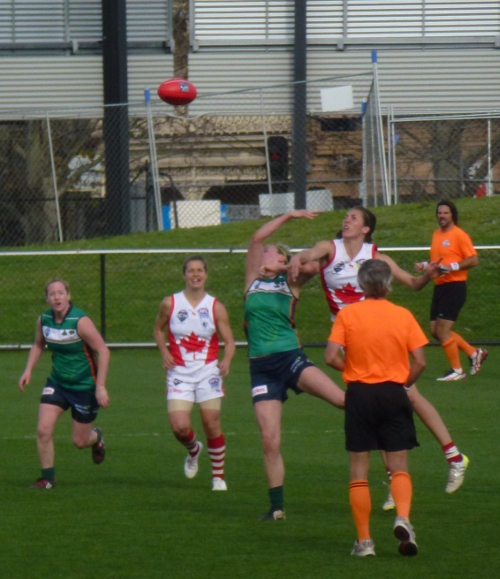
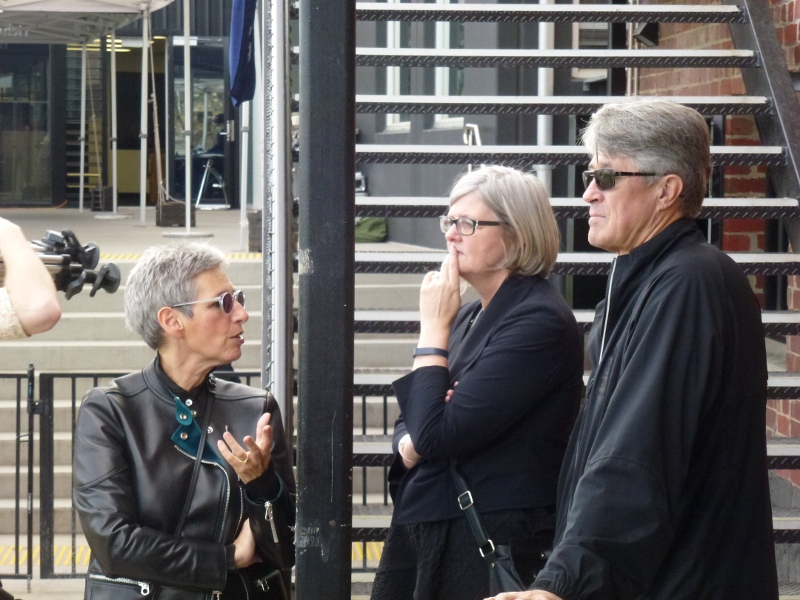
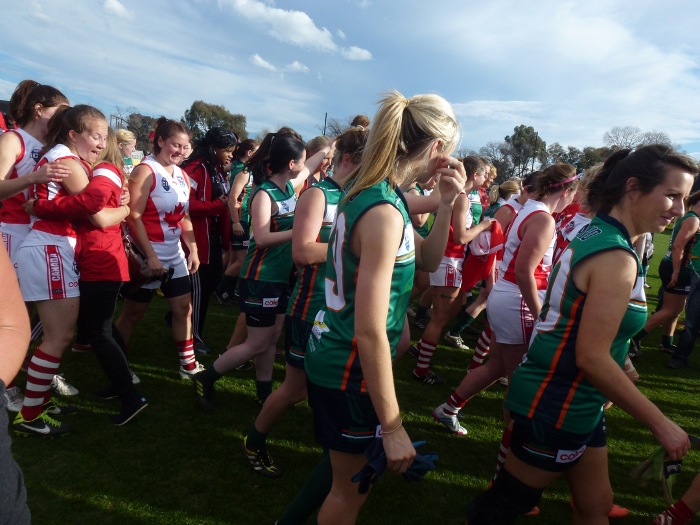
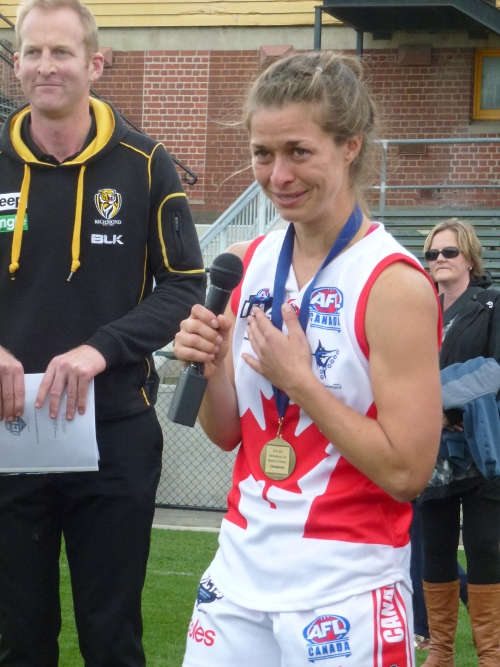
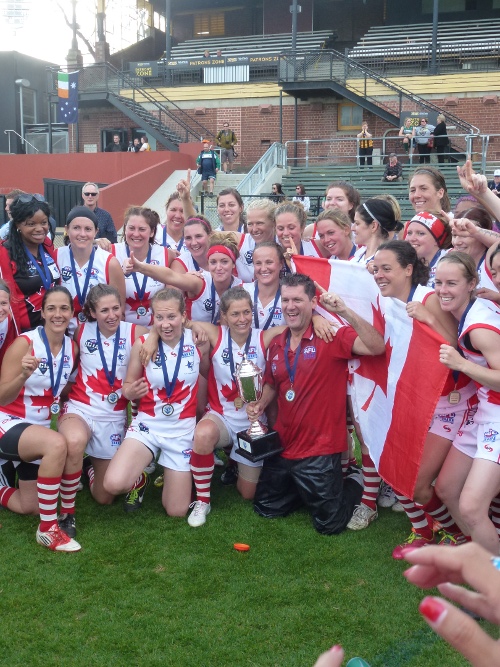
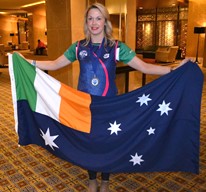 As grand a day as the Grand Final Saturday is of an International Cup – perhaps the greatest day is the final Friday. Not only are many of the best matches of the tournament to be witnessed but with the tournament coming to an end on the field each of the sides savours the contest and camaraderie all the more. And when the final siren sounds for each side the focus shifts. Around Royal Park on the sun drenched Friday afternoon there was to be seen a thriving barter trade in footy guernseys. Eventually the crowds traipse off – the players in particular prepare for the evenings event – the traditional International Cup Gala dinner. The dinner now held at the Palladium Room at the Crown (Casino) Entertainment complex has been described by The Age senior writer Martin Flanagan (the 2011 dinner) as one of the best footy functions he’d ever attended. And he was back for the 2014 event and like he – those of us lucky enough to attend feel privileged to do so.
As grand a day as the Grand Final Saturday is of an International Cup – perhaps the greatest day is the final Friday. Not only are many of the best matches of the tournament to be witnessed but with the tournament coming to an end on the field each of the sides savours the contest and camaraderie all the more. And when the final siren sounds for each side the focus shifts. Around Royal Park on the sun drenched Friday afternoon there was to be seen a thriving barter trade in footy guernseys. Eventually the crowds traipse off – the players in particular prepare for the evenings event – the traditional International Cup Gala dinner. The dinner now held at the Palladium Room at the Crown (Casino) Entertainment complex has been described by The Age senior writer Martin Flanagan (the 2011 dinner) as one of the best footy functions he’d ever attended. And he was back for the 2014 event and like he – those of us lucky enough to attend feel privileged to do so. 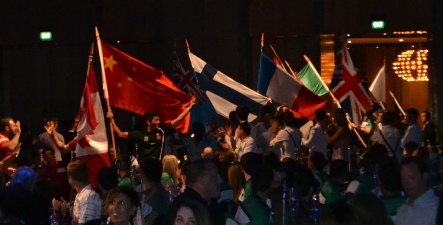 MC James Sherry sets the scene and an early highlight is the welcome of the team captains from the back of the room – they march proudly baring their flags up the centre of the room and onto the main stage where they (the flags) are placed as a permanent backdrop for the evening. This clearly marks this AFL function from the rest – when else can the AFL validly adorn a room with the flags of 18 other nations.
MC James Sherry sets the scene and an early highlight is the welcome of the team captains from the back of the room – they march proudly baring their flags up the centre of the room and onto the main stage where they (the flags) are placed as a permanent backdrop for the evening. This clearly marks this AFL function from the rest – when else can the AFL validly adorn a room with the flags of 18 other nations. 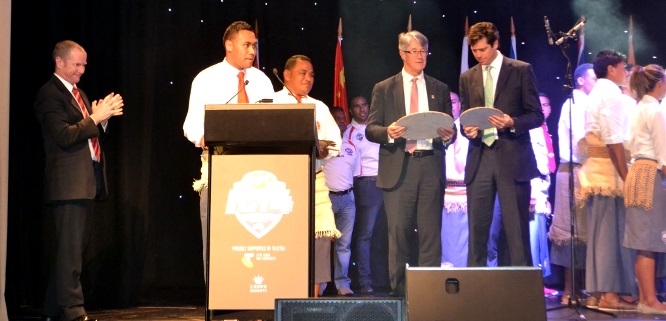
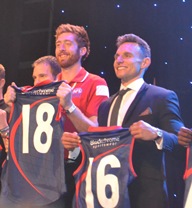 In between there are 3 courses of food to be enjoyed – sate the appetite – but that’s not the focus. There’s a room to be worked. For me this time around I’ve put in greater effort to get to know some of the players and try to share their personalities, and their stories. There are more to be learned and there are acquaintances – almost friends – to farewell. For Troy Thompson and myself there are particular players to track down – see Troy’s story. Meeting Canada’s Neil Casey and hearing a fine Irish accent immediately highlights another backstory – but, almost everybody here has a backstory. So many are ‘accidental footballers’. Some of those have now become ‘Accidental Australians’ – football migrants. One of those I’ve met who has been super embracing of this tournament since 2005 is Great Britain’s Luke Matias. Four tournaments on he lives and works in Australia and married last year – so much is predicated to the mate who kicked a footy to him. The segue here is to the World Teams both mens and womens. Dipper is on hand taking the main stage to congratulate those selected. The honour and pride is clear, both by those selected and by their teammates who roar approval – drowning out the announcements of the next.
In between there are 3 courses of food to be enjoyed – sate the appetite – but that’s not the focus. There’s a room to be worked. For me this time around I’ve put in greater effort to get to know some of the players and try to share their personalities, and their stories. There are more to be learned and there are acquaintances – almost friends – to farewell. For Troy Thompson and myself there are particular players to track down – see Troy’s story. Meeting Canada’s Neil Casey and hearing a fine Irish accent immediately highlights another backstory – but, almost everybody here has a backstory. So many are ‘accidental footballers’. Some of those have now become ‘Accidental Australians’ – football migrants. One of those I’ve met who has been super embracing of this tournament since 2005 is Great Britain’s Luke Matias. Four tournaments on he lives and works in Australia and married last year – so much is predicated to the mate who kicked a footy to him. The segue here is to the World Teams both mens and womens. Dipper is on hand taking the main stage to congratulate those selected. The honour and pride is clear, both by those selected and by their teammates who roar approval – drowning out the announcements of the next. 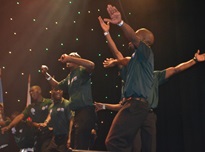 As the night drew later the lads from South Africa performed and a little later bare chested Kiwis – nay – Hawks took to the stage and performed the Haka. Ah that my New Zealand wife might have been here to see it – well, perhaps best not. Around the room though was the mixing – yes, there’s a grand final or two to be played the next day and after that for many a flight or two home. The International Cup gala dinner truly is a footy night like no other – it can’t be on the annual calendar but once every 3 years it’s footy’s little secret that all too many just don’t realise what they’re missing out on. Like a lot in life however – the more you put in the more you get out – and don’t doubt for a minute that the players attending have put in a lot to make their way to our shores for 2 weeks at great expense to display a passion for the game that many AFL fans might struggle to comprehend. ...
As the night drew later the lads from South Africa performed and a little later bare chested Kiwis – nay – Hawks took to the stage and performed the Haka. Ah that my New Zealand wife might have been here to see it – well, perhaps best not. Around the room though was the mixing – yes, there’s a grand final or two to be played the next day and after that for many a flight or two home. The International Cup gala dinner truly is a footy night like no other – it can’t be on the annual calendar but once every 3 years it’s footy’s little secret that all too many just don’t realise what they’re missing out on. Like a lot in life however – the more you put in the more you get out – and don’t doubt for a minute that the players attending have put in a lot to make their way to our shores for 2 weeks at great expense to display a passion for the game that many AFL fans might struggle to comprehend. ...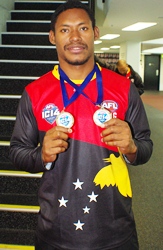 You couldn't help but notice the great AFLPNG jumpers when you saw them at IC14 - thanks to David Lake coach of the PNG Mosquitoes for giving us some background to the new design in the following submission.
You couldn't help but notice the great AFLPNG jumpers when you saw them at IC14 - thanks to David Lake coach of the PNG Mosquitoes for giving us some background to the new design in the following submission.